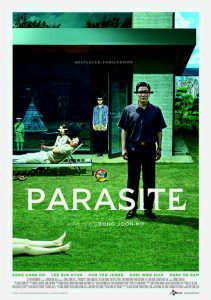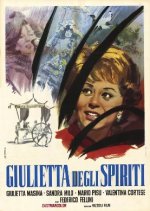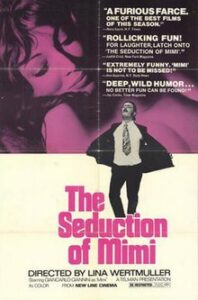Parasite-2019
Director Joon-ho Bong
Starring Song Kang-ho, Jang Hye-jin
Top 250 Films #157
Scott’s Review #963
Reviewed November 28, 2019
Grade: A
Parasite (2019) is a South Korean language film that has it all. The writing is powerful and thought-provoking, the direction is unique and intriguing, the acting is stellar, and the story is perfectly paced with dizzying twists and turns.
The film is uncomfortable and unsettling (in a good way), shifting from dark humor to horror by the time the shocking finale unfolds—an experience that will both dazzle and ravage the viewer with the emotions it instills.
The story centers on two families. The affluent Park residents live in the lap of luxury, enjoying the finer things in life, such as a lavish residence, a personal driver, and a live-in housekeeper.
Park Dong-ik is the CEO of an IT company; his beautiful wife, Park Yeong-gyo, stays at home with their two children, Park Da-hye and Park Da-Song. They are rich and, on the surface, somewhat spoiled and superficial.
The struggling Kims reside in a semi-basement that constantly floods, accept menial jobs to pay the bills, and are grifters.
Patriarch Kim Ki-taek and his wife, Kim Chung-sook, have two teenage children, Kim Ki-woo and Kim Ki-jeong. They are cagey and resourceful, devising schemes to generate money. Each is good-looking but struggles to find much success in life.
Kim Ki-woo’s friend tutors the Park family’s daughter and will soon travel abroad for further studies. He convinces Kim Ki-woo to interview for the position, who easily gets the job by charming the gullible Park Yeong-gyo.
He and the rest of the Kims devise an elaborate scheme to infiltrate the Park family by deceiving Mr. and Mrs. Park into dismissing their driver and housekeeper. The Parks are unaware that their new staff are related!
The underlying theme of Parasite is one of class distinction and social inequality. The tension builds more and more with each scene, and the monetary differences between the haves and have-nots are always on the surface.
Once the Kims get a taste of the good life, they have no intention of being satisfied merely as hired help- they want it all for themselves.
The fact that the Kims are clever and manipulative is no accident on the part of the director, Joon-ho Bong.
Conversely, the Parks are gullible and easily outsmarted by the Kims. Why are they rich, and the Kims poor? The audience wonders. Are we to root for the Kims to overtake the Parks? The Kims are no saints, as they resort to firing other people to get what they want.
Allegiances to characters will shift along the way.
As the Kims get comfy one night in the Park house, when the family goes on a weekend camping trip, the film takes off. Drunk and sparring with each other, the doorbell rings, and the haggard former housekeeper begs to be let in.
When she claims to have left something behind in the basement, this leads to a shocking secret and dramatic turn of events. I did not see the revelation coming, and events only catapult the film into something else.
The pacing and tension during this scene are outstanding.
It’s tough to rival this scene, but the film does just that with the gruesome and bloody birthday party sequence. The proverbial “sh## hits the fan” as the tensions among the characters come to life.
The scene results in several deaths, and the rage of a prominent character reaches a crescendo.
The scene is set on a gorgeous sunny day, perfect for birthday cake, balloons, and shiny wrapped presents. After a lovely start, the party becomes laden with blood, screams, and intensity.
Bong portrays the Kim patriarch as the most sympathetic character, and a montage at the end of the film reinforces this. The other characters are less benevolent and more complicated.
When Mrs. Kim shoves the family dog, she is unlikeable, but then she is kind to the former housekeeper.
Mrs. Park appears innocent at first, but then she becomes a shrew when she plans her son’s birthday party, expecting everyone to cater to her every whim. Finally, Mr. and Mrs. Park mock Mr. Kim behind his back and insinuate that poor people “smell funny”.
Do the Parks deserve their fates?
Parasite (2019) is a dark film characterized by clever writing and effective character development, taking audiences on a rollercoaster ride.
The subtitles do little to detract from the fantastic experience this film offers as Bong spins a spider web of deceit, desperation, and tragedy.
Viewers will undoubtedly be discussing this one for days to come.
Oscar Nominations: 4 wins-Best Picture (won), Best Director-Bong Joon-ho (won), Best Original Screenplay (won), Best International Feature Film (won), Best Production Design, Best Film Editing
Independent Spirit Award Nominations: 1 win-Best International Film (won)







